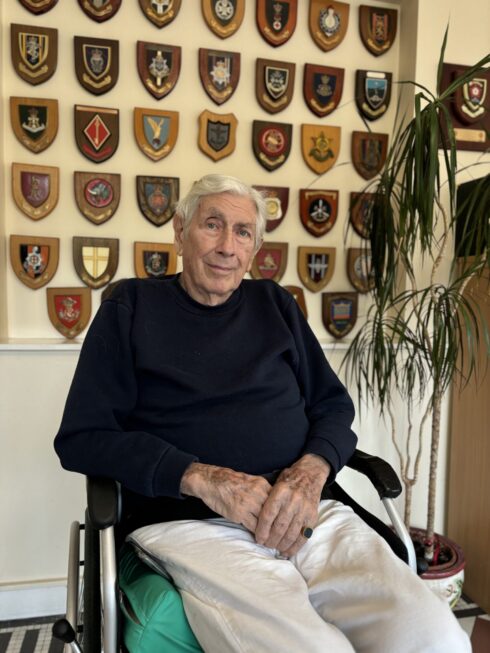About Us > How we have helped so far > David Giles
Growing up during WWII
David can still keenly recall the moment that War was announced in 1939. He said, “I can still remember listening to Mr Chamberlain saying that there had been no reply from Mr. Hitler, and therefore we were at War”. After witnessing the Bristol Blitz (a period of regular bombing in Bristol from November 1940 to April 1941), David, his brother, sister and mum moved to Washington, USA as refugees in 1940 on “an old Cunard Liner, RMS Samaria”. David shared that the crossing was “pretty chaotic because there were large numbers of people – there were four times more passengers than were normally taken”. The journey was marked by a harrowing near-miss, as a ship called Arandora Star, which had set off from the same port towards Canada, was sunk by a U-47, commanded by Gunther Prien, struck the ship with the remaining torpedo. When talking of the 800 lost souls (many of which were German and Italian internees) on board the Arandora, David reflected, “we were lucky, we got away”.
In Washington, David and his family took up residence with his Uncle and Aunt, whilst his mother sought work with the British Embassy. David’s mother stayed in regular contact with his Father and wrote once of a Christmas Eve party at the Embassy for senior staff, which had Mr. Churchill and Ambassador Lord Halifax in attendance. David shared that his Mother “wrote back to my father that Mr. Churchill was rather Tiddly. He stood up on a chair, then on a table, saying, I’m little Tommy Tucker and I’m singing for my supper”.
Moving Through the Ranks of The Royal Navy
David’s journey with the Royal Navy began at the age of 16 as an ordinary seaman. After five months serving, David was promoted to Mid-Shipman, and remained in post until his friend Julian Mitchell persuaded him to join the Submarine Service. During his two years of National Service, he rose to the role of Gunnery Officer aboard a submarine, and beyond that, David gave twenty years in reserve. Reflecting on his time in service, David recalls: “We went to Beirut, we went to Gibraltar and we went out into the Atlantic for weeks tracking Soviet submarines.”
David’s military service also saw him called up during the Cuban Missile Crisis, underscoring the vital role he played during a tense period of global history. After leaving the Navy, David transitioned into a successful career in aviation engineering and naval ship design, collaborating with his business partner Peter Thornycroft on projects from the Standard Trinity House Pilot Boat to frigates and destroyers using his patented design principles.
Arrival at Care for Veterans
David joined Care for Veterans in July following a severe diagnosis of Guillain Barre Syndrome, a condition that causes nerve degradation and weakness. Since then, he has benefited from regular physiotherapy to maintain his strength. Despite ongoing challenges, David shared his appreciation: “The physiotherapists are delightful, and the facilities are excellent. I don’t think there’s anywhere I could have been that is more appropriate.”
Rehabilitation and Progress
Lead Physiotherapist Belle commended David’s determination: “David has shown exceptional commitment to maintaining as much strength as possible. He attends physiotherapy three times a week and participates in afternoon cycling sessions when he can. His resilience has exceeded expectations; despite early doubts about his ability to walk again, he is now walking with a frame and managing stairs. His progress is inspiring.”
David’s story reflects the critical role that tailored support and rehabilitation play in improving veterans’ quality of life. His experiences highlight the importance of providing specialized care to those who have served their country.

Responsive site designed and developed by
Click to go Madison Web Solutions' website